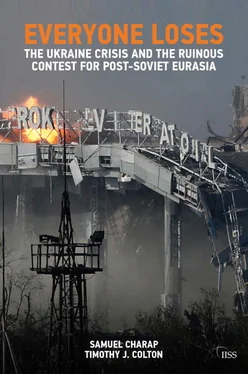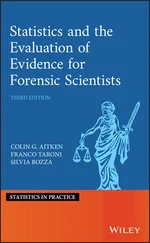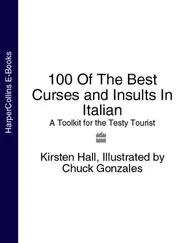Russia seemed to soften its position in May 2013, when Ukraine, while in the last stages of negotiations with the EU on the AA, signed a memorandum on cooperation with the EEC, granting Kyiv observer status. Yanukovych called European Commission president José Manuel Barroso the same day to reassure him that the memorandum did not contradict the AA. But Russia was not content with Yanukovych’s plan to integrate only to the extent that Ukraine’s EU commitments allowed. The very day the memorandum was signed, Glaziev said ‘Observer status is only granted to states that want to join our integration project…. Since we agreed to give Ukraine observer status… that means Ukraine intends to join our union.’ [13] Sergei Sidorenko and Andrei Kolesnikov, ‘Mezhdu soyuzom i sovetom’, Kommersant Ukraina , 30 May 2013, http://www.kommersant.ru/doc/2200231 .
Ukraine had never spoken of such an intention.
Moscow was still pushing hard on Yanukovych – but its bottom line seemed to have shifted. Some observers claimed that Russia would still accept nothing less than full Ukrainian membership of the Customs Union (and subsequently the EEU). Certainly that was Moscow’s preferred outcome, but by 2013 it was no longer issuing ultimatums to Ukraine to join straight away. The heavy-handed pressure that began that summer came in the context of the impending signing of the AA, planned for the November summit of the EU and the In-Betweens (in EU-speak, the Eastern Partnership countries) in Vilnius. And if that went ahead, Ukraine would be forever lost for Russia-led integration efforts. Russia was now primarily concerned with forestalling that outcome and keeping the prospect of eventual integration open, rather than demanding immediate Ukrainian membership.
The instrument Moscow deployed was characteristically blunt. Beginning in July 2013, Russia imposed trade sanctions on Ukraine, first by cutting off imports of confectionery products, fruit, vegetables and poultry. It then hit steel manufacturers and other exporters with cumbersome new customs procedures. ‘De facto, there is a complete halt on Ukrainian exports’, the Ukrainian manufacturers trade group reported. [14] Roman Olearchyk, ‘Russia Accused of Triggering Trade War with Ukraine’, Financial Times , 15 August 2013, http://www.ft.com/cms/s/0/99068c0e-0595-11e3-8ed5-00144feab7de.html .
For several days the next month, the Russian authorities applied extensive customs checks to all Ukrainian imports, all but totally blocking them.
Although normal trade resumed in less than a week, the message of these actions was clear: if Kyiv were to proceed with the AA, it should expect a disruption in bilateral trade with Russia. [15] Just in case Kyiv misunderstood, Glaziev, by now a Kremlin adviser to the president, spelled it out in a statement to the press. See Sergei Smirnov, ‘Rossiya ob”yasnila uzhestochenie tamozhennogo rezhima s Ukrainoi’, Vedomosti , 18 August 2013, https://www.vedomosti.ru/politics/articles/2013/08/18/rossijskie-vlasti-obyasnili-za-tamozhne .
Specifically, Moscow threatened to scrap Ukraine’s trade preferences under the CIS’s extant free-trade pact, an effective increase in average tariffs of more than ten percentage points. It was estimated that this would have reduced Ukrainian exports to Russia by 17% per year, shaving off 1.7% of Ukraine’s GDP annually. [16] Mykola Ryzhenkov, Veronika Movchan and Ricardo Giucci, ‘Impact Assessment of a Possible Change in Russia’s Trade Regime Vis-a-Vis Ukraine’, Institute for Economic Research and Policy Consulting/German Advisory Group, November 2013, http://www.beratergruppe-ukraine.de/download/PolicyBriefings/2013/PB_04_2013_en.pdf .
Russian spokesmen used a spurious economic argument to justify this threat as something other than crude coercion: they claimed that European goods would enter Ukraine duty free under the DCFTA, and then ‘flood’ the Russian market by exploiting CIS free-trade rules governing Russia–Ukraine commerce. As Putin said, ‘We say, it’s your choice… but keep in mind that we will be forced to defend our market.’ [17] ‘Zasedanie mezhdunarodnogo diskussionnogo kluba “Valdai”’, 19 September 2013, http://kremlin.ru/events/president/news/19243 .
Perhaps such a risk existed on the margins, but rules of origin – the globally accepted benchmarks for determining the national source of a product – would have allowed the Russian customs authorities to distinguish between EU and Ukrainian goods in the vast majority of cases. Why repeatedly make an argument that most trade experts considered facetious? A charitable explanation is that many in Moscow made worst-case assumptions about the AA and DCFTA due to the lack of dialogue with Ukraine and the EU on the subject. Or, more likely, this talking point could have been a cover story for Moscow’s efforts to block the AA, which would certainly have redirected Ukraine’s trade away from Russia in the long term.
The Russian squeeze on Ukraine’s economy did not stop Yanukovych from pushing ahead with the AA; his government formally approved the final draft on 18 September. But furious wheeling and dealing was ongoing away from public view. Yanukovych knew that the EU was keen to have the AA signed at the November Vilnius summit and angled for concessions from Brussels in the final weeks. Despite voluminous evidence that Ukraine’s politics were becoming more authoritarian and its political economy increasingly monopolised by Yanukovych’s family and inner circle, the EU was still ready to sign the AA with Kyiv if it allowed Tymoshenko to leave prison for medical treatment in Germany.
The EU’s focus on the Tymoshenko case had blown its significance out of proportion. Her imprisonment after a politically motivated prosecution was just one example of broader failings in Ukrainian democratic governance that had become more acute under Yanukovych but long predated him. A weak judicial system was chronically subject to manipulation by patrons in the executive branch and the business elite. But Brussels’ need to emerge victorious in what was now an open geo-economic bidding war with Moscow trumped the principle that greater integration should only be offered in return for reform. The conditionality for signing the AA was thus reduced to a single symbolically rich but systemically insignificant step.
Brussels even dropped that residual demand in the end. In the weeks before the Vilnius summit, Yanukovych seized on the EU’s visible eagerness to move ahead, with the apparent expectation not only that Brussels would give up on Tymoshenko, but that it would also provide financial compensation to offset the cost of Moscow’s expected retaliation, which he claimed would amount to US$160bn. While the EU declined to pay the financial ransom, it relented on Tymoshenko. Poland had pushed for the concession, arguing that if Ukraine did not sign the AA, it was just a matter of time before Moscow re-established control over the country. ‘Never again do we want to have a common border with Russia’, the Polish president is said to have informed Chancellor Merkel. [18] Christiane Hoffmann et al., ‘Summit of Failure: How the EU Lost Russia over Ukraine, Part 2: Four Thousand Deaths and an Eastern Ukraine Gripped by War’, Spiegel Online , 24 November 2014, http://www.spiegel.de/international/europe/war-in-ukraine-a-result-of-misunderstandings-between-europe-and-russia-a-1004706-2.html .
But that was not enough for Yanukovych. Despite the EU’s last-minute concession on Tymoshenko, the Ukrainian cabinet issued an order suspending preparations to sign the AA just a week before Vilnius. The same order called for the establishment of a trilateral commission with Russia and the EU to discuss trade relations and the renewal of active dialogue with the countries of the Customs Union on trade and economic issues. While Yanukovych did not stop proclaiming his commitment to European integration, it was clear that the AA would not be signed at Vilnius.
Читать дальше











